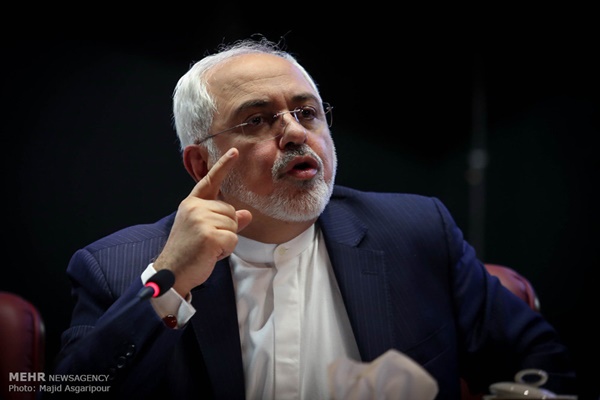In a recent interview with ISNA, Iran’s FM Mohammad Javad Zarif said problems between Iran and Saudi Arabia will not be solved through mediation.
He said the problem is that Riyadh thinks it should create tension in order to advance its policies in the region.
However, said Zarif, Saudi Arabia should drop its delusional policies and efforts to fuel anti-Iran sentiment in the region.
Here are excerpts from his remarks in the Farsi interview:
At the 2017 security conference in Munich, Iran once again put forward the idea of forming a regional forum for dialogue. This is an appropriate policy that Iran is pursuing. Iran believes its interests will be ensured through cooperation, interaction and dialogue with neighbours.
Some Mideast Countries Playing Blame Game
Unfortunately, some neighbouring countries backed former Iraqi strongman Saddam Hussein during the eight-year war imposed on Iran in the 1980s, and are now supporting terrorists. Their influence in the region has dwindled and their status has been undermined due to their actions. These countries are playing a blame game over their problems and do not want to accept responsibility for their actions. But these moves will not make Iran deviate from its right policies. Engagement with neighbouring countries is a central plank of Tehran’s policy. We should have cooperation and hold dialogue with them, and we will continue this policy.
Neighbours Should Avoid Trying Wrong Paths Again
Iran recommends that its neighbours rethink their previous policies which have only brought about destruction and insecurity for them and for the whole region, and choose the right path. We diplomats say “Diplomats choose the right path after trying the wrong paths.” Some of our neighbours have tried wrong paths enough, and now it’s time they choose the right path.
No Positive Behaviour by Saudi Officials
The letter sent to the Iranian president by the Kuwaiti emir was written on behalf of all Persian Gulf littoral states. It shows Saudi authorities apparently agree with the content of the letter. But we do not see any positive approach and behaviour on the part of Saudi officials. Riyadh continues to stoke tension in the region through its policies rather than seeking to go for dialogue and interaction.
Saudi authorities had pinned their hopes on the negative atmosphere created against Iran before the conclusion of a nuclear agreement between Tehran and the P5+1 countries. That negative climate had been created as a result of anti-Iran resolutions by the UN Security Council. Of course, the anti-Iran propaganda at the time did not affect us because Iran’s growth, development, security and economy are based on local potentialities. So, we were not that much affected by international pressure. Of course those pressures created some problems for us, but failed to force us into submission. Unfortunately, certain regional countries had pinned their hopes on the anti-Iran propaganda at the time. When the pressure was removed after the signature of the JCPOA, they made every effort to restore anti-Iran propaganda.
Some Neighbours Have Illusions
Iran’s neighbours will soon realize that anti-Tehran policies are a nonstarter, and that the best way is to engage in dialogue with Iran. Iran has the region’s best interests at heart and would like to engage in cooperation and dialogue with regional countries. Of course, some other regional countries have illusions and think they can revive the kind of domination that gripped the region in the past. But in the modern era, the region brooks no domination. I am optimistic that regional countries will finally opt for engagement and dialogue with Iran. My optimism emanates from the regional and international realities. The common threat of extremism and terrorism in the region will come back to haunt those who have contributed to the formation and development of terrorist groups and offered them financial, political and arms support. I also believe regional countries will come to understand that the policy of Iranophobia is useless and they will have to go for interaction and cooperation.
Mediation No Solution to Iranian-Saudi Problems
The Saudi foreign minister recently said that Iraq, as a neutral country, can mediate between Iran and Saudi Arabia. I don’t think there is any need for mediation. Of course, we have not opposed countries which have expressed their willingness to play a positive role in establishing relations between Iran and Saudi Arabia. We have not rejected their proposal to act as intermediaries and we have looked at the idea positively. But the point here is not the issue of mediation. The problem is that Riyadh thinks it should create tension in order to advance its policies in the region. However, Saudi Arabia should drop its delusional policies and efforts to fuel anti-Iran sentiment in the region.
Riyadh’s Aggression against Yemen Fuelling Insecurity
Saudi policies which only stoke tension in the region have negative consequences. The Saudi attack on Yemen has only fuelled insecurity and strengthened terrorist groups. I think it is necessary that all regional countries prudently review their past policies and I hope they will realise that regional problems can be solved through dialogue, not by engaging foreign troops in the region. Then, problems can be solved, with or without mediation. Riyadh should drop the illusions based on which it seeks to fuel tension in the region and should go for dialogue and interaction.
